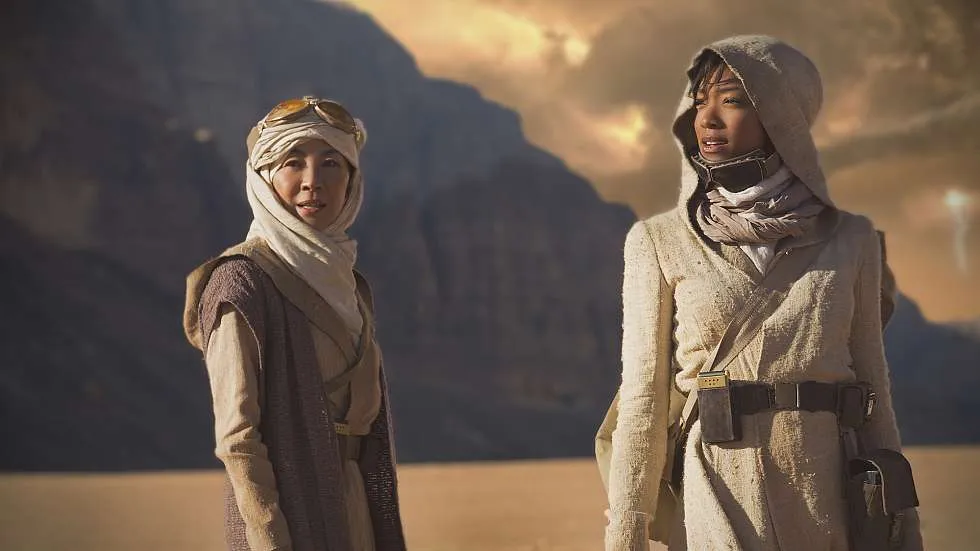
A new Star Trek series is coming and we're told it's going to be gritty. It has been 12 years since we last had a small screen Star Trek, and in that time television has experienced a revolution. The Wire was still in production back then, and that was just the start of what became the full invasion of tele-novels with so many characters and subplots they would've made Victor Hugo's eyes bleed. This comes along with deep conflicts and mature content.
Yes, when you drive by the local AMC the kids ask what that building is and you have to explain that it is a temple where their ancestors used to worship the old gods, before everyone moved to Westeros and took their clothes off. You could leave that last part out, but let's just be honest and admit that your kids have seen more GoT than you.
I'm going to have to put aside for the moment that the signs haven't been good for this Trek show that has suffered from epic mismanagement. The franchise divorced in 2005, when Viacom split and gave the TV rights to CBS while leaving the film rights to Paramount. The latter had guided Star Trek in all its forms for 50 years and is still making movies. CBS, I am told, used to make ridiculously popular TV shows. I'm serious, look it up. They called it M*A*S*H. I guess there are some people who still watch Big Bang Theory too. Let's just say I'd be happier if Star Trek: Discovery was going to be a Netflix Original. They got Kevin Spacey and Winona Ryder, for christ's sake. CBS couldn't even sign Michael Dorn.
Let's assume they've overcome these problems. What does their marketing department mean when they say it's going to be grittier than past Star Treks? I think they feel like TV is more "grown up" these days and the episodic plots and PG content that marked much of past endeavors won't cut it in the post Walter White era. What this means most of all is that they will abandon Gene Roddenberry's centeal edict against conflcit among the main characters.
I think that is a good start, if it is done right. I understand that harmony among the weekly regulars was an expression of Roddenberry's founding vision of Star Trek as taking place in a humanist utopia where humans, among other species, had abandoned their petty squables to point their combined strengths towards the stars. For years scriptwriters complained that this made writing drama nearly impossible and over time they mixed in more conflict until at last this has become not a dirty secret, but a selling point for a new series. If we have left behind the series Prime Directive, does that mean the result is something that isn't really Star Trek? Not necessarily.
Let's be frank. Gene Roddenberry had a vision, but I think others may have understood that vision a little better. Like George Lucas, he cereated one of the most iconic story worlds of the 20th century, but sometimes seemed to be at a loss as to how he did it or what made it special. One thing that Gene didn't seem to get is that not all conflict is made equally. Antigone's brothers may have died in a petty quarrel, but Antigone herself defied Creon to follow the higher laws of the gods and grant honor to Polynices. The two conflicts originate from two different motivations.
It is entirely possible for mature people driven by logic, compassion, and a desire to advance humanity to have diferences in opinion. One could argue that many of the most pressing problems facing our society have no clear solution we can all agree on if only we weren't so small minded. We can only attack these big problems if we put aside the silly arguments, which to me sounds like what Roddenberry was after. Indeed, a united Earth that expands its reach into the stars would likely encounter new problems we can only begin to imagine, especially when you add non-humans in the mix. More social complexity will only lead to more ambiguity about which choices are best, not less. In many cases there is no right answer at all. That will still create conflict even among the most well meaning individuals. Our only hope of surviving such challenges is embracing Roddenberry's vision so that we have a foundation on which to stand.
That only covers the social scale. On a personal level, I don't think we will ever escape the impediments and losses and guilts that make up a human life and lead to innner conflict. Sometimes that does lead to interpersonal differences. That doesn't mean we are all childish drama queens trying to draw attention to our little problems while there is a big universe out there. And as with society, people who live among the stars are likely to come into contact with more existential angst, not less. Any life questioning they may do might just result from them being more "grown up" than the average person today. If forced to actually live with the complete reality that Star Trek only implies, one would need to develop some steely resolve to mentally survive.
If Discovery embraces these ideals, then it will certainly go to some dark places. People will bemoan that it is no longer Star Trek, but in reality it may become the show all its predecessors were struggling to become. It may acheive the full potential of Roddenberry's founding vision.
- image courtesy of CBS AllAccess*
/--------------------------------------/
Thank you for reading! If you likd fiction, maybe check out my serialized horror story, "Feeble As Frail". Here are the posts available so far: